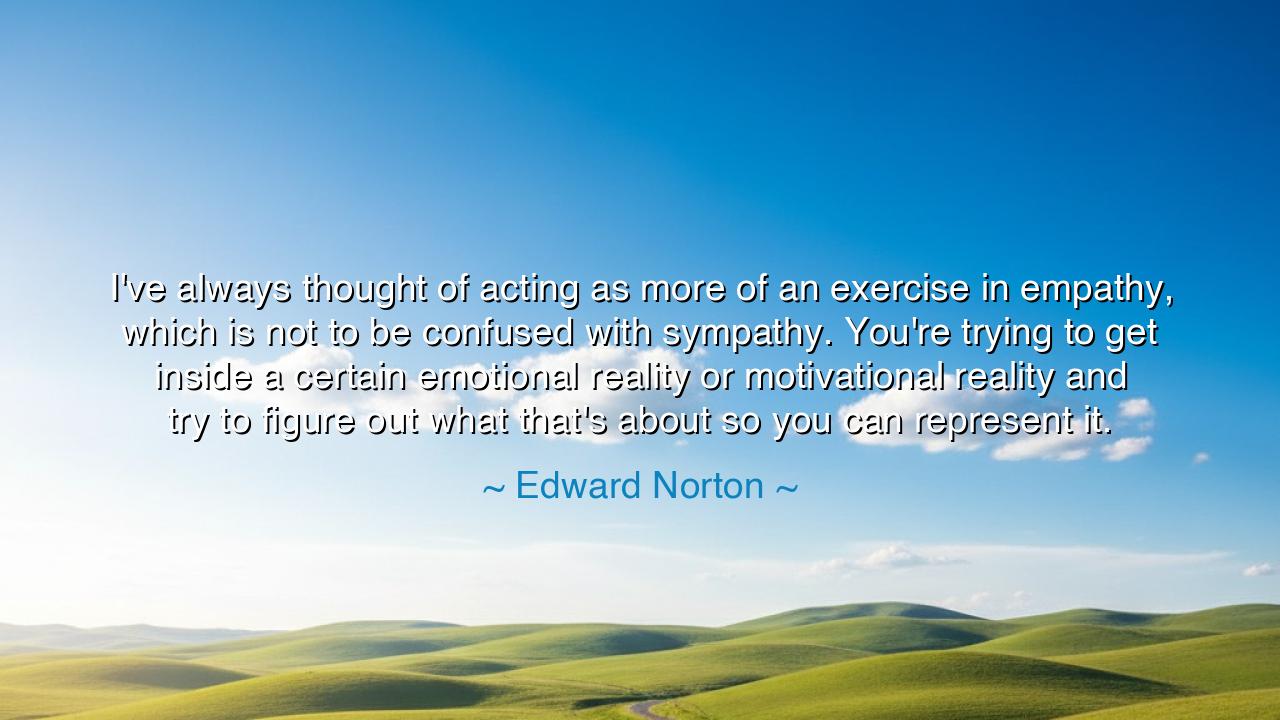
I've always thought of acting as more of an exercise in empathy
I've always thought of acting as more of an exercise in empathy, which is not to be confused with sympathy. You're trying to get inside a certain emotional reality or motivational reality and try to figure out what that's about so you can represent it.






Hear the words of Edward Norton, master of his craft, who declares with the wisdom of one who has walked many lives in a single lifetime: “I've always thought of acting as more of an exercise in empathy, which is not to be confused with sympathy. You're trying to get inside a certain emotional reality or motivational reality and try to figure out what that's about so you can represent it.” This is no ordinary reflection on the art of performance—it is a profound truth about the human spirit, about how we may learn to walk in the shoes of others, to inhabit their struggles, and to give voice to lives beyond our own.
At the heart of this saying is the sacred word: empathy. Norton reminds us that empathy is not the same as sympathy. Sympathy looks from the outside, offering pity or sorrow for another’s suffering. But empathy enters the chamber of another’s heart. It asks, “What does this feel like? What would move me if I were them? What fires or fears drive their choices?” In this way, the actor’s task becomes a mirror for humanity itself: to go beyond judgment and to seek understanding. It is a discipline of compassion sharpened into craft.
The origin of this truth stretches back to the ancients. The tragedians of Greece—Sophocles, Euripides, Aeschylus—did not write plays merely to entertain. They wrote to draw audiences into the realities of kings and beggars, warriors and women, gods and mortals. When Athenians wept at the story of Oedipus or Antigone, they were not sympathizing from afar—they were empathizing, entering into those lives, feeling what they felt. Theater was not escape; it was transformation. It taught an entire people to understand themselves by first understanding others.
History itself shows how this exercise in empathy can shape the world. Consider Harriet Beecher Stowe, whose novel Uncle Tom’s Cabin opened the eyes of a nation to the cruelty of slavery. She was not herself enslaved, yet through imagination and deep empathy she stepped into that emotional and motivational reality and represented it in words so powerful that Abraham Lincoln is said to have called her “the little lady who started this great war.” Through storytelling, she expanded the conscience of society itself.
Norton’s wisdom reveals that acting, and indeed any art, is not about pretending—it is about entering truth by way of imagination. The actor does not wear a mask to deceive; they wear it to reveal. By living out another’s fears, joys, and desires, the actor shows the audience pieces of themselves they might otherwise ignore. Thus, acting becomes a vessel of empathy, teaching us not only who others are, but who we might be under different skies.
The lesson for us, then, is not confined to the stage or the screen. It is for daily life. For we too are called to practice empathy, to ask not only what people do, but why they do it—what motivational reality compels their choices. When confronted with anger, ask what fear lies beneath it. When met with cruelty, ask what pain may have birthed it. To live with empathy is to refuse the simplicity of judgment and instead embrace the complexity of human truth.
What actions, then, must we take? We must learn to listen deeply, to imagine courageously, and to represent others fairly in our speech and thought. Read widely, not only tales of those like yourself but of those far different. Seek conversations that stretch your heart. When tempted to condemn, pause to ask what hidden story might explain. In doing so, we become not merely spectators of humanity, but participants in its healing.
Thus let Norton’s words endure: acting is empathy in action, and empathy is the key to human understanding. Whether upon the stage, in the marketplace, or within the home, let us strive not merely to sympathize, but to enter the inner life of others. In this way, we honor the dignity of every soul and, in seeing the world through their eyes, we expand the light of our own.






AAdministratorAdministrator
Welcome, honored guests. Please leave a comment, we will respond soon